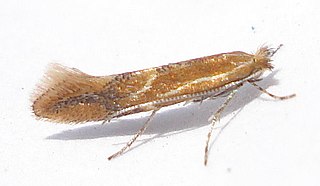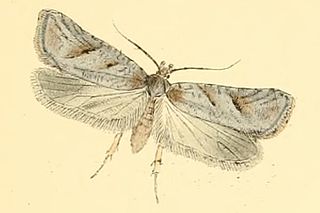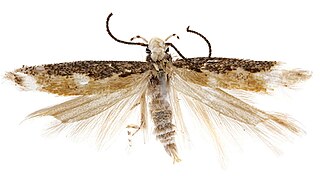
The Elachistidae are a family of small moths in the superfamily Gelechioidea. Some authors lump about 3,300 species in eight subfamilies here, but this arrangement almost certainly results in a massively paraphyletic and completely unnatural assemblage, united merely by symplesiomorphies retained from the first gelechioid moths.

Gelechioidea is the superfamily of moths that contains the case-bearers, twirler moths, and relatives, also simply called curved-horn moths or gelechioid moths. It is a large and poorly understood '"micromoth" superfamily, constituting one of the basal lineages of the Ditrysia.

Aristotelia is a genus of moths in the family Gelechiidae. Well-known species are food plant specialists, and diverse hosts are used – Salicaceae, Solanaceae, Rosaceae, Fagaceae, Fabaceae, Asteraceae.

Dactylethrella is a genus of moths in the family Gelechiidae. The genus was described by Thomas Bainbrigge Fletcher in 1940 and is a replacement name for Dactylethra Meyrick (preoccupied).

Metzneria is a genus of moths in the family Gelechiidae, described by Philipp Christoph Zeller in 1839.

Syncopacma is a genus of moths in the family Gelechiidae.

Eudonia is a large and widespread genus in the grass moth family (Crambidae), subfamily Scopariinae. There is no common name for the roughly 250 species placed here; new species are still being described regularly. Although the genus was proposed early in the 19th century, many of these moths were for a long time retained in Scoparia, the type genus of the subfamily and a close relative of Eudonia. A few small genera have been proposed for separation from Eudonia, but given the size of this group this is not particularly convincing; thus, all are retained here pending a comprehensive phylogenetic review.

Udea is a genus of snout moths in the subfamily Spilomelinae of the family Crambidae. The genus was erected by Achille Guenée in 1845. The currently known 216 species are present on all continents except Antarctica. About 41 species are native to Hawaii.
Allotalanta is a genus of moths in the family Cosmopterigidae. It was first described by Edward Meyrick in 1913.

Phalonidia is a genus of moths belonging to the subfamily Tortricinae of the family Tortricidae.

Phyllonorycter is a genus of moths in the family Gracillariidae.

Epicephala is a genus of moths in the family Gracillariidae.

Stathmopoda is a genus of moths. It has variously been placed in its own family, Stathmopodidae, or in subfamily Stathmopodinae in the family Oecophoridae. Note that the phylogeny and systematics of gelechoid moths are still not fully resolved.

Perittia is a genus of moths of the family Elachistidae.

Agonopterix is a moth genus of the superfamily Gelechioidea. It is placed in the family Depressariidae, which was often – particularly in older treatments – considered a subfamily of the Oecophoridae or included in the Elachistidae.

Exaeretia is a moth genus of the superfamily Gelechioidea. It is placed in the family Depressariidae, which is often – particularly in older treatments – considered a subfamily of Oecophoridae or included in the Elachistidae.

Gracillariinae are a subfamily of moths which was described by Henry Tibbats Stainton in 1854.

Gelechiinae is a subfamily of moths in the family Gelechiidae. It was described by Henry Tibbats Stainton in 1854.

Stathmopodidae is a family of moths in the moth superfamily Gelechioidea described by Edward Meyrick in 1913.
Oedematopoda illucens is a moth of the family Stathmopodidae. It was described by Edward Meyrick in 1914. It is found in Sierra Leone and Mpumalanga, South Africa.


















